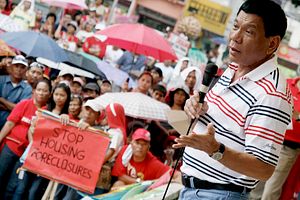In a move that sparked headlines around the world, Philippine President Rodrigo Duterte placed the whole island of Mindanao under martial law in response to the attacks of a local terror group known as Maute, which is suspected of having ties with the Islamic State (ISIS). Duterte said he was forced to declare martial law in the country’s southernmost island following an outbreak of violence in some parts of Marawi City.
But as has been proven with other events in the Philippines, Duterte’s rhetoric attracted as much if not more attention than the reality on the ground. Most interestingly, when he was asked why he extended the scope of martial law in all Mindanao regions outside of Marawi, he responded that the terror threat should not be underestimated and that it was time to solve all problems in the island.
What did he mean by that statement? He could be referring to one of several things, with the controversial ‘war on drugs’ or the active recruitment of ISIS in the Muslim-dominated areas of Mindanao being the two most likely ones.
Equally important, Duterte’s comments also left out some important specifics that could have significance not only for the terror threat that international media outlets tend to focus on, but also the ongoing peace process in the Philippines.
For instance, would martial law also target the other armed groups operating in Mindanao? These groups are currently engaged in peace negotiations with the government.
The Moro National Liberation Front (MNLF) and Moro Islamic Liberation Front (MILF) have existing peace agreements with the government. But at the same time, both continue to have armed followers in their respective territories. Meanwhile, the communist-led New People’s Army (NPA) claims it has established a revolutionary base in many parts of the island. Similar to the MNLF and MILF, the Communist Party (CPP) which leads the NPA has resumed peace talks with the government when Duterte became president in 2016.
Though it is still early days, what has been the impact of the Mindanao-wide martial law on these ongoing peace initiatives thus far?
The MILF issued a statement appealing to the government to ensure that “ceasefire mechanisms continue to work on the ground” and that “any military operations does not spark more fighting in other areas.”
At the same time, it denounced the terror activities of Maute. “There is no justification for launching an offensive against civilian populace and to destroy infrastructures and institutions serving the public,” the group said.
It also affirmed its earlier decision “to settle the legitimate grievances of the Bangsamoro people through a negotiated process.” It called the Duterte government to “immediately implement the peace agreement so that no other groups may use its non-implementation to justify their continued pursuit of violence for violence’s sake.”
So far, at least based on the pronouncements of MILF leaders, the martial law declaration appears to have not disrupted the peace process between the government and the country’s dominant Muslim political group.
But it’s a different story for the peace talks involving the communists.
Asked during a press briefing about the Mindanao-wide coverage of martial law, Department of National Defense Secretary Delfin Lorenzana explained that the military has to deal with terror groups in Zamboanga, Sulu, Tawi-Tawi, and Central Mindanao. He added that the government also has to do something about the NPA extortion activities in southern Mindanao.
The NPA leadership cited Lorenzana’s statement as proof that martial law is also intended to suppress the communist forces in Mindanao, and possibly in other areas of the country. It called for the intensification of offensives as a counter measure to the imposition of martial law.
The government’s peace panel chairman Silvestre Bello III criticized the CPP for “misreading” the intention of Duterte and for making it difficult to talk peace because of the order to escalate attacks against government troops. Subsequently, the government canceled its participation in the fifth round of talks and demanded the CPP to retract its order. Later, it clarified that the peace process is only suspended while waiting for a “compelling reason” and “conducive environment” in order to resume talks with the communists.
For its part, the CPP insisted that its actions are purely defensive and that it is the government which has been attacking communities outside Marawi. It claimed that martial law has led to aerial bombings and excessive military deployments in many areas of Mindanao, displacing civilians and destroying the livelihoods of farmers in the countryside.
Meanwhile, Duterte urged MILF, MNLF, and the NPA to unite with the government in eliminating the threat posed by Maute and other ISIS-backed groups.
Since the declaration of martial law, most of the headlines have been devoted to the Maute group and the ISIS threat in the Philippines, while very little has been discussed about its impact on the various peace processes involving armed groups in Mindanao, which Duterte had signaled as one of his administration’s top priorities upon assuming power. As the weeks progress, it will be interesting to see whether the administration uses martial law as part of a narrower anti-terror campaign, or whether it uses it as part of a broader political strategy to resolve the armed conflict that has been plaguing Mindanao for decades.

































